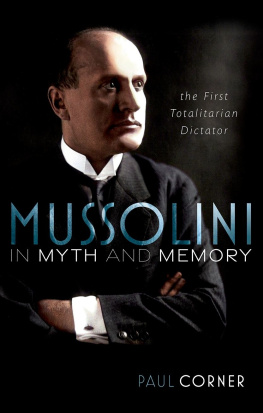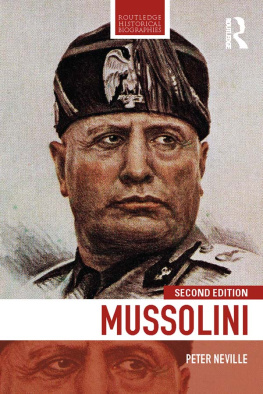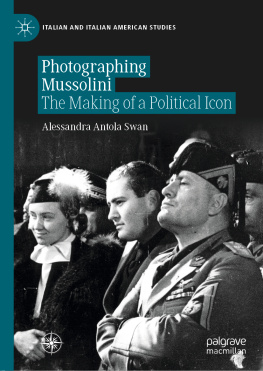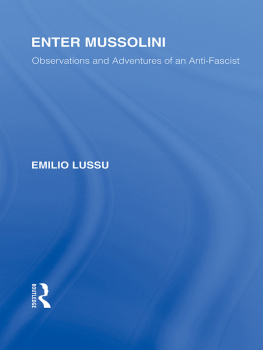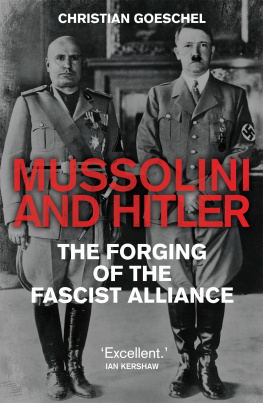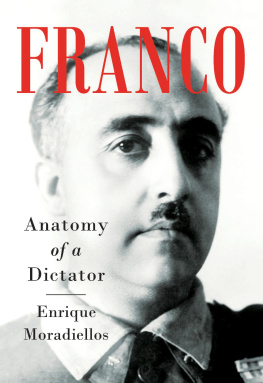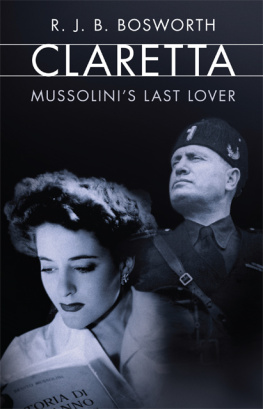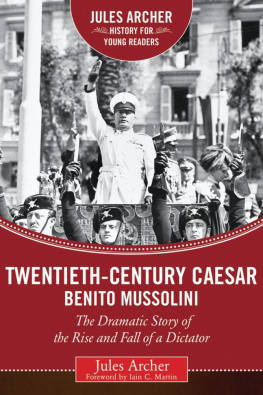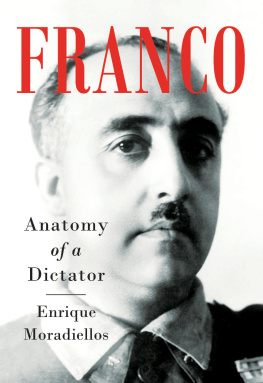Mussolini in Myth and Memory

Great Clarendon Street, Oxford, ox 2 6 dp , United Kingdom
Oxford University Press is a department of the University of Oxford. It furthers the Universitys objective of excellence in research, scholarship, and education by publishing worldwide. Oxford is a registered trade mark of Oxford University Press in the UK and in certain other countries
Paul Corner 2022
The moral rights of the author have been asserted
First Edition published in 2022
Impression: 1
All rights reserved. No part of this publication may be reproduced, stored in a retrieval system, or transmitted, in any form or by any means, without the prior permission in writing of Oxford University Press, or as expressly permitted by law, by licence or under terms agreed with the appropriate reprographics rights organization. Enquiries concerning reproduction outside the scope of the above should be sent to the Rights Department, Oxford University Press, at the address above
You must not circulate this work in any other form and you must impose this same condition on any acquirer
Published in the United States of America by Oxford University Press
198 Madison Avenue, New York, NY 10016, United States of America
British Library Cataloguing in Publication Data
Data available
Library of Congress Control Number: 2022932837
ISBN 9780192866646
ebook ISBN 9780192691903
Printed and bound in the UK by Clays Ltd, Elcograf S.p.A.
Links to third party websites are provided by Oxford in good faith and for information only. Oxford disclaims any responsibility for the materials contained in any third party website referenced in this work.
Acknowledgements
This book was written during the pandemica period in which it was not always easy to confer with colleagues or to access libraries and archives. Nonetheless I owe thanks to many people who helped me in one way or another, despite the circumstances. Not all can be listed here but, for help and encouragement in various forms, I should like to thank in particular, Richard Bosworth, Filippo Focardi, Jie-Hyun Lim, Cecilia Palombelli, Ian Kershaw, and Paul Preston. As always Adrian Lyttelton was a constant source of stimulus even though our occasional lunches in Santa Croce were so dramatically curtailed by events. Obviously none of the above-named has any responsibility for the final product.
The book would not have seen the light of day without the patience and understanding of the editors at OUPMatthew Cotton and Cathryn Steelewith whom it has been a pleasure to work. I should also like to thank two anonymous readers who made helpful and very constructive comments on an early draft. A final word of thanks must go to my wife, Giovanna Procacci, whose readiness to discuss many of the issues dealt with in this book has been, as always, an invaluable asset.
Florence, February 2022
Contents
domestic exile
local fascist organization
provincial fascist leader
German Democratic Republic (East Germany)
fascist leaders, local and national
fascist university groups
fascist national welfare organization
fascist Militia
fascist organization for Maternity and Infants
fascist secret police
National Fascist Party
fascist mayor of a commune
police station, chief of police
powerful local fascist leaders
violent actions of the squadristi
violent blackshirt activists, organized in squads
synonymous with fascist regime (twenty years)
Soviet ideological slogans get reborn in the mass consciousness, but are mistaken for a realitya phantom utopiathat never existed
Lev Gudkov
(Levada Center, Moscow)
We remember the past not in order to get it right, but in order to get it wrong
Alon Confino
(UMass Amherst)
We are a country without memory, which is like saying without history. Italy removes its recent pastkeeping only those memories, those fragments that might be useful for its contortions, its conversions
Pier Paolo Pasolini
(Scritti corsari)
Dictators come, dictators go. Very often their departure is accompanied by expressions of popular jubilation, mitigated in some cases only by uncertainty about what may come next. Once a relatively secure stabilization is achieved the verdict is usually undisputed. Three years after Stalins death, his name could finally be linked to the word criminal in a way unthinkable in the Soviet Union before 1953. With Hitler there was little discussion. When the extent of the Holocaust came clearly into focus (and it took more than a decade for this to happen), Hitlers name became virtually synonymous with evil. More recently, for anyone enjoying Christmas television in 1989, the sight of the bodies of Nicolai and Elena Ceauescu lying huddled in a desolate courtyard near Bucharest remains indelible. In this last case judgement was immediate. Popular anger directed at the dictator was such that, in defence of the hasty trial and summary execution, the former Romanian defence minister declared that shooting was preferable to the spectacle of the couple being lynched by a mob in the street. And if, for the moment, the North Korean Kim dynasty has avoided popular overthrow, there can be few doubts, judging from what escapees recount, that its eventual demise will not be mourned with copious tears.
Dictators have been accused of most things, often with reason, even if they have sometimes provided useful scapegoats for the difficulties their successors found they had to face. Certain accusations are common. The pursuance of disastrous foreign policies is a charge that can be levelled at many dictators and it is not difficult to think of examples. But it is at the level of domestic politics that they most often seem to resemble each other. Arbitrary power is frequently seen as leading to private enrichment. Whether Ceauescus kitchen scales were really made of solid gold remains in question, but the story fits well with what people expected of the mans behaviour, essentially corrupt and self-regarding. Indeed, corruption comes high on the list of accusations made of dictatorships; the deviation of public funds into the private pockets of a privileged elite is judged to be a common phenomenona phenomenon particularly galling in what are frequently countries with very limited resources. Any protest against either corruption or peculation is impossible because of a system of justice itself subservient to the political elite and all too ready to interpret the law, even where there is a semblance of legality, in the interests of that elite. Underlying all these problems are the central questions of the denial of rights and the repression of certain libertiesof freedom of speech, freedom of assembly (and of opposition to authority), freedom of movement, and so on. Repression denies people the right to express themselves in a multitude of ways, forcing them to conform to certain patterns set by authority. You are compelled to behave as if you support the regime.
The list of offences is long and would seem to be enough to condemn this type of regime in perpetuity. Yet, surprisingly, this is not so. With the exception of Hitler, dictators and dictatorships seem to be making a comeback in public perceptions. It is most obvious in the case of contemporary Russia, where, according to the Moscow-based Levada Center, there has been a steady rise in the percentage of Russians disposed to view Stalin in a favourable light75% at the last survey in 2019. In fact, the coffee mugs depicting Stalin and Putin sit happily side by side in St Petersburg souvenir shops. And Russia is not the only example. In Romania, even the once-reviled figure of Ceauescu has been transformed, within 2018almost 65% of Romanians declaring a positive opinion of their former leader. Although such figures have to be read with due caution, the trend seems clear. In some senses at least, dictators and dictatorships are back in the public eye and that eye is not always unfavourable.

